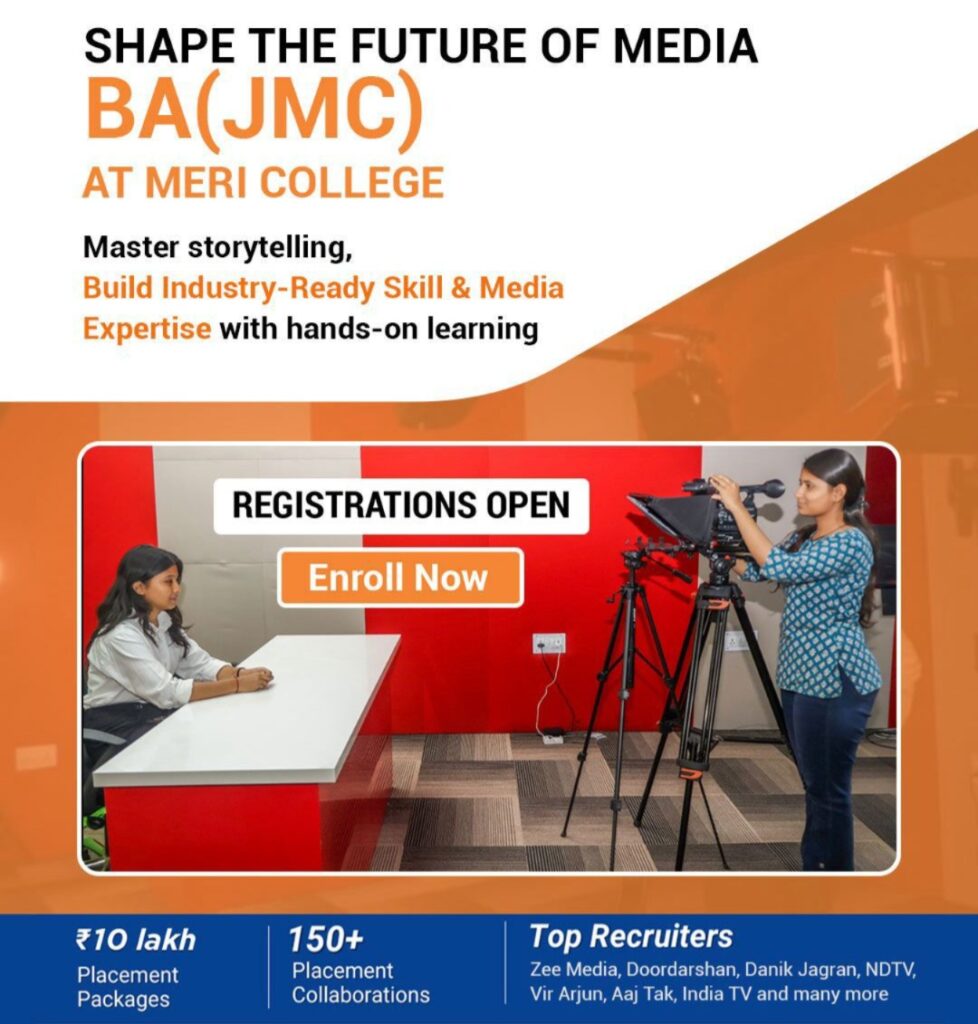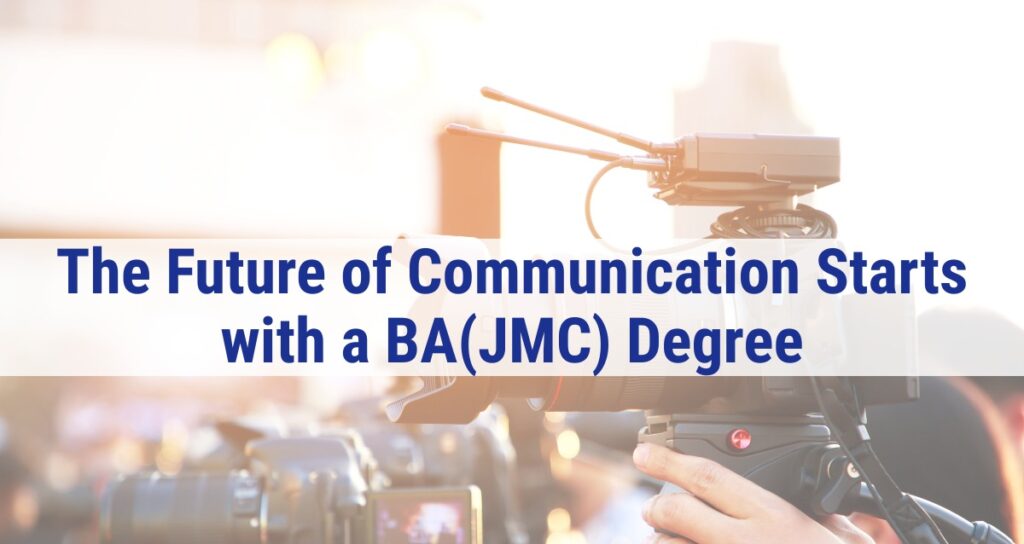In today’s fast-paced, digitally saturated world, the ability to communicate effectively has become more than a skill—it is a competitive advantage. From multimedia storytelling to digital content creation and public relations strategy, modern communicators are influencing how society interprets events and interacts with information. As new platforms emerge and consumer attention becomes increasingly fragmented, structured education in this field becomes more critical than ever.
A Bachelor of Arts in Journalism and Mass Communication BA(JMC) program is designed not only to cultivate creativity but also to build a strategic mindset, essential for professionals who aim to thrive in this dynamic environment. With the communications industry evolving rapidly, a degree in journalism serves as a strategic foundation for those aspiring to lead and innovate in journalism, advertising, digital media, and corporate communication.
The Power of a BA(JMC) Degree
A BA(JMC) degree is not merely academic. It is a confluence of creativity, technology, and strategy. Students learn core journalistic principles, visual storytelling, multimedia production, content writing, advertising dynamics, media ethics, and the legal frameworks that underpin this critical field. What distinguishes the top institutes offering this degree is the ability to translate theory into applied knowledge. With a curriculum that blends communication theory, mass media laws, and audience psychology with hands-on practicals, graduates are prepared to tackle real world challenges across media sectors. This degree opens doors to careers in television, digital journalism, advertising, corporate communications, filmmaking, and more.
Industry Exposure and Practical Learning
The communication landscape values agility, practical knowledge, and multi-platform storytelling. Leading institutions ensure that their BA(JMC) programs offer exposure beyond textbooks. Media lab projects, real-time editorial practice, and public relations campaigns sharpen professional capabilities.
In today’s competitive environment, it is not just about learning what communication is—it’s about experiencing how communication operates across sectors and platforms. That is why hands-on exposure to real-world challenges through workshops, industrial visits, and data analytics are pivotal.
The MERI College Advantage

For aspiring communicators seeking a strong academic foundation coupled with immersive practical exposure, MERI College emerges as a distinguished choice. Management Education and Research Institute is the top BA(JMC) institute in Delhi NCR, offering a highly industry-aligned curriculum embedded with real-time experiences and academic rigor.
Furthermore, the institute actively promotes industrial integration through value-added courses that combine theoretical learning with real-world exposure. Students also gain access to intensive club activities, cultural events, art-integrated learning, and PDPS sessions tailored for final-year students. These activities nurture both personal and professional growth.
The infrastructure at MERI College includes smart screens, modern communication labs, and access to MERI e-Learning systems and ERP, and LMS platforms that enable seamless digital academic engagement. With a dedicated Research Centre and over 30+ international collaborations, students benefit from a truly global perspective.
What truly sets MERI College apart is its holistic, placement-ready approach. One-on-one mentoring during pre-placement drives ensures that each student receives personalized guidance to achieve their career goals. Located nearest to a metro station, it also offers excellent accessibility—a vital consideration for students commuting across the city.
Alumni engagement is another strength, with a legacy of 5,000+ alumni. These professionals often return to the campus to mentor, guide, and share insights with current students, enriching the learning environment with real-world perspectives.
Preparing for the Global Stage
In the communication field, local awareness combined with a global perspective is critical. MERI College understands this need and incorporates international exposure and industrial immersion through academic trips and partnerships. Such opportunities enable students to experience diverse media ecosystems and understand cross-cultural communication practices.
Courses are not confined to Indian media alone—they are designed to create professionals who are ready to operate globally, whether in newsrooms in Delhi or marketing departments in Singapore. The higher education assistance programs also guide students in pursuing master’s degrees abroad or entering international communication careers.
This balance of local relevance and global readiness helps students evolve into communicators capable of influencing diverse audiences and interpreting multi-dimensional narratives.
Conclusion
In an era where every brand is a publisher and every individual is a content creator, communication is more strategic than ever. A BA(JMC) degree is more than just a stepping stone—it is a launchpad for future storytellers, media professionals, and communication strategists. With institutions like Management Education and Research Institute, which is the Top BA(JMC) institute in Delhi NCR, offering a career-focused, technology-enabled, and globally informed approach, the future of communication is in highly capable hands.
Choosing the right platform to begin this journey is crucial. MERI College not only equips students with academic depth and practical insight but also provides the global exposure, mentorship, and infrastructure needed to become leaders in the media and communication space.
As the industry continues to evolve, so does the need for highly skilled communicators. And for those ready to pursue excellence in media and communication, a BA(JMC) degree from the right institute is where the journey begins.
Frequently Asked Questions (FAQ)
Management Education Research Institute, Offers a 3 year Bachelor’s Degree in Journalism and Mass Communication. MERI’s BA(JMC) programs equip students with core journalism skills like news writing, reporting, and media law, alongside broader media studies. For those seeking a more specialized path, a BA in Scriptwriting can be beneficial for those interested in crafting narratives for various media platforms.
BAJMC: 10+2 with a minimum of 45% marks for GEN/OBC & 40% for SC/ST from any stream.
The BA in Journalism and Mass Communication (BA (JMC) is a 3-year undergraduate program, divided into six semesters. It combines theoretical foundations with practical applications, covering various aspects of journalism, advertising, public relations, and digital media.
- Duration: 3 years (full-time).
- Eligibility: 10+2 from a recognized board with a minimum of 50% aggregate marks.
- Admission Process: Entrance through IPU CET (Common Entrance Test) followed by counseling.



